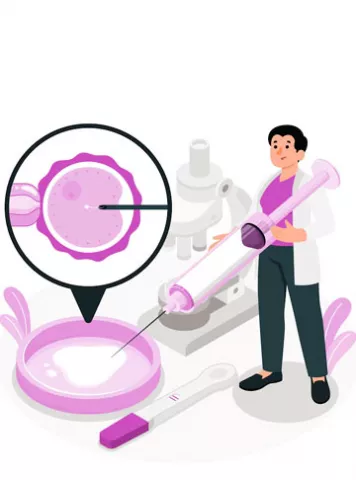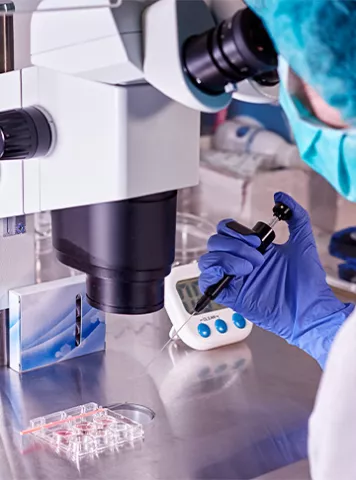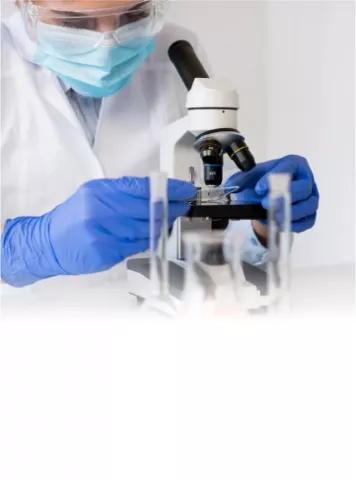Pros and Cons of ICSI
ICSI or Intracytoplasmic Sperm Injection is a form of IVF (in vitro fertilization) that is most commonly used in cases of extreme male infertility, after oocyte preservation (egg freezing) or after repeated failure with the conventional IVF attempts. In the case of regular IVF, several sperms are placed with an egg together. This is done so that the sperm enters the egg and fertilize it naturally. Contradiction to that, the ICSI process involves the embryologist taking a single sperm and injecting directly into an egg.
In certain fertility clinics, ICSI is recommended for every IVF cycle. In other clinics, the treatment is reserved only for those with extreme male infertility and in certain medical reasons. Despite being a highly advanced method, there are certain disadvantages of ICSI which are mainly associated with its risk factors. It is because of these disadvantages there are arguments against the treatment being used routinely.
Why is ICSI done?
The typical use of ICSI is extreme male infertility, which includes:
- Oligospermia or extremely low sperm count
- Teratozoospermia or abnormal shape of the sperm
- Asthenozoospermia or poor motitlity of the sperm.
In case a man is producing sperm but his ejaculate doesn’t contain any sperm, it is possible to retrieve the sperms via TESE or testicular sperm extraction. When TESE is used for sperm retrieval, it is necessary to use ICSI. The treatment is also used when retrieval of the sperm is done from the urine of the man, i.e., in case of retrograde ejaculation.
While male infertility is the primary reason for the use of ICSI, it isn’t the only one. Other reasons may include:
- Lack of fertilized eggs during prior IVF cycles: If the eggs are retrieved in good numbers and the sperm count appears to be healthy as well, but the eggs do not fertilize. then ICSI is an option during next cycle of IVF.
- Use of frozen sperm: ICSI is recommended if the frozen sperms don’t look active
- Use of frozen oocytes: In case of egg vitrification, the shell of the eggs becomes harden by freezing. Fertilization becomes difficult ICSI can overcome such complications.
- Preimplantation Genetic Diagnosis (PGD): The IVF technology that allows the embryos to be genetically screened is known as PGD. If that is being done, the use of conventional fertilization techniques may cause the sperm cells that haven’t fertilized egg to still be around the embryo. This may cause interference with accurate results of PGD.
- In vitro maturation (IVM): an IVF technology involving retrieval of eggs from the ovaries before complete maturation. The last stages of maturation are completed in the lab. Certain researches have evidenced that the rate of fertilization of IVM eggs by sperms is comparatively lower to conventional IVF. There is a need more researches to be done on that matter, but it is always a good option to go with ICSI in case of IVM.
Controversial use of ICSI
The benefits of ICSI are evident in so many situations and it is definitely an excellent technology when the need arises. However, there are situations where success rates are still debatable. Which includes:
- Eggs retrieved in lower numbers: When there are few eggs, there is a risk that fertilization won’t occur. ICSI might be a viable option in this case but there isn’t any evidence that live birth or pregnancy rates are improved with the use of ICSI.
- Unexplained infertility: In case of unexplained infertility, the cause of infertility is unknown. to overcome it ICSI is definitely one of the ways to go. However, there is no evidence that the success rates with live births improved when ICSI was used for unexplained infertility.
- Higher maternal age: Currently, there is no evidence stating the impact of high maternal age on fertilization rates. So, ICSI might not be necessary.
- Routine use of ICSI with IVF: It is believed by some reproductive endocrinologists that ICSI should be used for every patient simply for eliminating the possibility of failure with fertilization. However, there has been researching that shows that only 1 out of every 33 patients end up benefiting from ICSI being used routinely. The others did not get the benefits associated with ICSI but they will definitely be prone to the risks.
Pros and Cons of ICSI
What is the advantage of ICSI?
ICSI is an option definitely worth considering in case of poor general failure, ejaculation problems and other issues with male infertility. Individuals experiencing these problems can definitely get the benefits of ICSI treatment. It provides the male partner an opportunity to father a child using his own sperm. Couples can also go for ICSI before Opting to donor sperm for viable sperms. ICSI can be performed even if the man has undergone a vasectomy. In that case, viable sperm can be extracted directly from testicles using special sperm retrieval techniques and injected into the egg.
Are there any risks involved?
The procedure of ICSI is universally considered to be one with low associated risks. However, ICSI does come with a set of its own risks and disadvantages, as is the case with any aspect of medicine. Once the sperm is obtained, the male partner is not prone to any risk from the procedure. The only risks are with the techniques used for sperm retrieval, but they are negligible. Some known ICSI risk factors include:
- Embryo damage: Not all eggs that fertilize ends up in developing into healthy embryos. It is possible for some embryos and eggs to get damaged during the process of ICSI.
- Multiple pregnancy: Couples using ICSI along with IVF have a 30-35% increased chance of conceiving twin and 5%-10% chances of having triplets. When the mother carries multiples, there are increase risks of certain complications during pregnancy and childbirth, which includes high blood pressure, gestational diabetes, low amniotic fluid levels, premature labor or need of cesarean section.
- Birth defects: There is a 1.5%-3% risk of a major birth defect with normal pregnancy. The risk of birth defects is increased slightly with ICSI treatment, although its rare nonetheless. Some birth defects are associated with ICSI are Angelman syndrome, Beckwith-Wiedemann syndrome, sex chromosome abnormalities, and hypospadias. Also, the risk of a male offspring having fertility issues increase slightly. There is a possibility of genetic transfer of infertility.
It is because of these additional risks lot of doctors do not recommend the use of ICSI with every IVF cycle. It is understandable if ICSI is an absolute requirement for conceiving. If that is the case, make sure you consult your doctor regarding the advantages and disadvantages of using the technology. However, if it is possible to undergo an IVF cycle successfully, why should you risk something like a birth defect, no matter how negligible it is.
How successful the procedure completely depends on the individual patient and their health condition. Regardless, research shows that 25% of patients can conceive after just one attempt at ICSI. The procedure should be considered as a way to mingle the sperm and the egg, not as an assurance of pregnancy.
Articles
2022


Guide to infertility treatments ICSI
Microsurgical Epididymal Sperm Aspiration (MESA) in ICSI
MESA (Microsurgical Epididymal Sperm Aspiration) is a surgical sperm extractio...
2023


Guide to infertility treatments ICSI
What is Azoospermia? Azoospermia is a condition in which a man has no measu...
2022


Guide to infertility treatments ICSI
In this world full of health concerns and complicated terminologies that tag a...
Pregnancy Calculator Tools for Confident and Stress-Free Pregnancy Planning
Get quick understanding of your fertility cycle and accordingly make a schedule to track it















